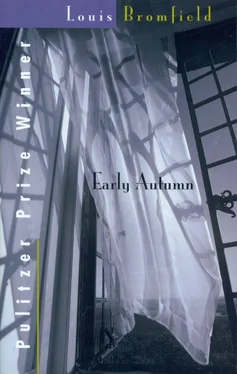“The party is not a great success,” he was saying.
“No.”
“No one seems to be getting on with anyone else. Mrs. Callendar ought not to have asked me. I thought she was shrewder than that.”
Olivia laughed softly. “She may have done it on purpose. You can never tell why she does anything.”
For a time he remained silent, as if pondering the speech, and then he said, “You aren’t cold out here?”
“No, not on a night like this.”
There was a silence so long and so vaguely perilous that she felt the need of making some speech, politely and with banality, as if they were two strangers seated in a drawing room after dinner instead of in the garden which together they had made beneath the ancient apple trees.
“I keep wondering,” she said, “how long it will be until the bungalows of Durharn creep down and cover all this land.”
“They won’t, not so long as I own land between Durham and the sea.”
In the darkness she smiled at the thought of an Irish Roman Catholic politician as the protector of this old New England countryside, and aloud she said, “You’re growing to be like all the others. You want to make the world stand still.”
“Yes, I can see that it must seem funny to you.” There was no bitterness in his voice, but only a sort of hurt, which again astonished her, because it was impossible to think of O’Hara as one who could be hurt.
“There will always be the Pentland house, but, of course, all of us will die someday and then what?”
“There will always be our children.”
She was aware slowly of slipping back into that world of cares and troubles behind her from which she had escaped a little while before. She said, “You are looking a long way into the future.”
“Perhaps, but I mean to have children one day. And at Pentlands there is always Sybil, who will fight for it fiercely. She’ll never give it up.”
“But it’s Jack who will own it, and I’m not so sure about him.”
Unconsciously she sighed, knowing now that she was pretending again, being dishonest. She was pretending again that Jack would live to have Pentlands for his own, that he would one day have children who would carry it on. She kept saying to herself, “It is only the truth that can save us all.” And she knew that O’Hara understood her feeble game of pretending. She knew because he stood there silently, as if Jack were already dead, as if he understood the reason for the faint bitter sigh and respected it.
“You see a great deal of Sybil, don’t you?” she asked.
“Yes, she is a good girl. One can depend on her.”
“Perhaps if she had a little of Thérèse or Mrs. Callendar in her, she’d be safer from being hurt.”
He did not answer her at once, but she knew that in the darkness he was standing there, watching her.
“But that was a silly thing to say,” she murmured. “I don’t suppose you know what I mean.”
He answered her quickly. “I do know exactly. I know and I’m sure Mrs. Callendar knows. We’ve both learned to save ourselves—not in the same school, but the same lesson, nevertheless. But as to Sybil, I think that depends upon whom she marries.”
(“So now,” thought Olivia, “it is coming. It is Sybil whom he loves. He wants to marry her. That is why he has followed me out here.”) She was back again now, solidly enmeshed in all the intricacies of living. She had a sudden, shameful, twinge of jealousy for Sybil, who was so young, who had pushed her so completely into the past along with all the others at Pentlands.
“I was wondering,” she said, “whether she was not seeing too much of you, whether she might not be a bother.”
“No, she’ll never be that.” And then in a voice which carried a faint echo of humor, he added, “I know that in a moment you are going to ask my intentions.”
“No,” she said, “no”; but she could think of nothing else to say. She felt suddenly shy and awkward and a little idiotic, like a young girl at her first dance.
“I shall tell you what my intentions are,” he was saying, and then he broke off suddenly. “Why is it so impossible to be honest in this world, when we live such a little while? It would be such a different place if we were all honest, wouldn’t it?”
He hesitated, waiting for her to answer, and she said, “Yes,” almost mechanically, “very different.”
When he replied there was a faint note of excitement in his voice. It was pitched a little lower and he spoke more quickly. In the darkness she could not see him, and yet she was sharply conscious of the change.
“I’ll tell you, then,” he was saying. “I’ve been seeing a great deal of Sybil in the hope that I should see a little of her mother.”
She did not answer him. She simply sat there, speechless, overcome by confusion, as if she had been a young girl with her first lover. She was even made a little dizzy by the sound of his voice.
“I have offended you. I’m sorry. I only spoke the truth. There is no harm in that.”
With a heroic effort to speak intelligently, she succeeded in saying, “No, I am not offended.” (It all seemed such a silly, helpless, pleasant feeling.) “No, I’m not offended. I don’t know. …”
Of only one thing was she certain; that this strange, dizzy, intoxicated state was like nothing she had ever experienced. It was sinister and overwhelming in a bitter-sweet fashion. She kept thinking, “I can begin to understand how a young girl can be seduced, how she cannot know what she is doing.”
“I suppose,” he was saying, “that you think me presumptuous.”
“No, I only think everything is impossible, insane.”
“You think me a kind of ruffian, a bum, an Irishman, a Roman Catholic, someone you have never heard of.” He waited, and then added: “I am all that, from one point of view.”
“No, I don’t think that; I don’t think that.”
He sat down beside her quietly on the stone bench. “You have every right to think it,” he continued softly. “Every right in the world, and still things like that make no difference, nothing makes any difference.”
“My father,” she said softly, “was a man very like you. His enemies sometimes used to call him ‘shanty Irish.’ …”
She knew all the while that she should have risen and sought indignant refuge in the house. She knew that perhaps she was being absurd, and yet she stayed there quietly. She was so tired and she had waited for so long (she only knew it now in a sudden flash) to have someone talk to her in just this way, as if she were a woman. She needed someone to lean upon, so desperately.
“How can you know me?” she asked out of a vague sense of helplessness. “How can you know anything about me?”
He did not touch her. He only sat there in the darkness, making her feel by a sort of power which was too strong for her, that all he said was terribly the truth.
“I know, I know all about you, everything. I’ve watched you. I’ve understood you, even better than the others. A man whose life has been like mine sees and understands a great deal that others never notice because for him everything depends upon a kind of second sight. It’s the one great weapon of the opportunist.” There was a silence and he asked, “Can you understand that? It may be hard, because your life has been so different.”
“Not so different, as you might think, only perhaps I’ve made more of a mess of it.” And straightening her body, she murmured, “It is foolish of me to let you talk this way.”
He interrupted her with a quick burst of almost boyish eagerness. “But you’re glad, aren’t you? You’re glad, all the same, whether you care anything for me or not. You’ve deserved it for a long time.”
Читать дальше












